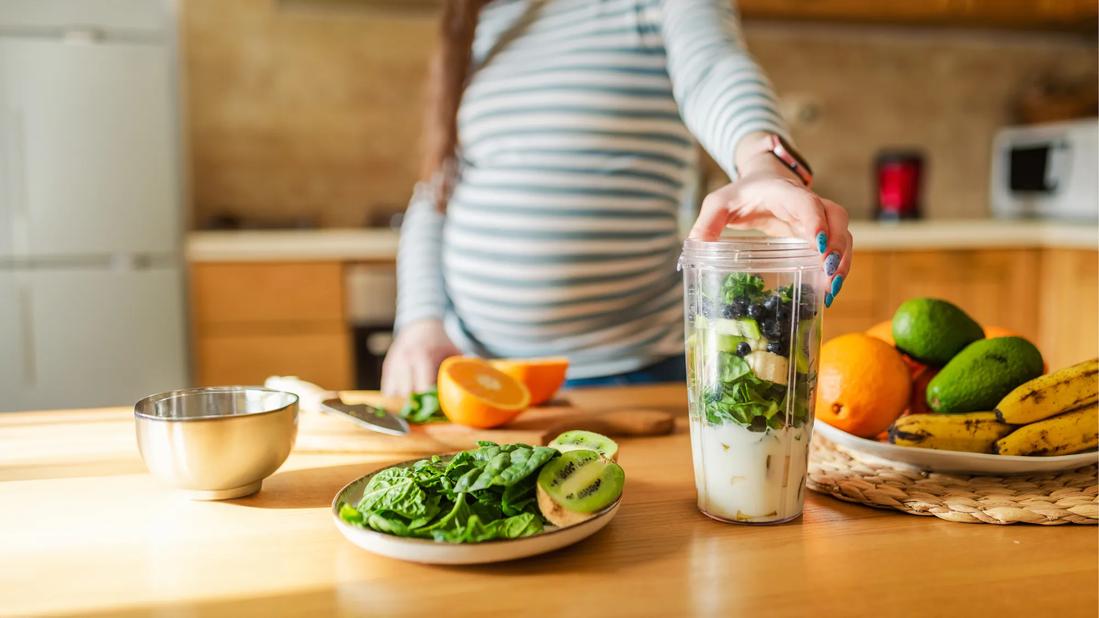Lifestyle changes can help, but you may also need medication

Image content: This image is available to view online.
View image online (https://assets.clevelandclinic.org/transform/5bc8c51a-8cd7-4f37-8e95-b6c74e6b794e/pregnant-eating-healthy-1370930240-sm)
Someone who's pregnant making a healthy smoothie
There’s a lot to think about during pregnancy, and your blood pressure may not be at the top of your mind.
Advertisement
Cleveland Clinic is a non-profit academic medical center. Advertising on our site helps support our mission. We do not endorse non-Cleveland Clinic products or services. Policy
But it’s important to get it checked regularly. Because blood pressure is an important indication of a healthy pregnancy. And if it’s too high, your provider can help you take steps to lower it.
High-risk obstetrician Oluyemi Aderibigbe, MD, MBBS, explains why healthy blood pressure during pregnancy is so important and how to keep it in a healthy range.
Your blood pressure is a combination of two numbers: a top number (systolic) and a bottom number (diastolic). These two numbers tell you how your heart is pumping and functioning.
“Blood pressure measures the pressure of your heart pumping blood throughout your body, getting the blood where it needs to go,” Dr. Aderibigbe explains.
During pregnancy, 140/90 is the threshold for high blood pressure. More than 160/110 is considered very high.
Getting one high blood pressure reading doesn’t necessarily mean you have high blood pressure. Your provider will likely take multiple measurements to confirm whether your blood pressure is within a healthy range.
High blood pressure during pregnancy can harm you and affect healthy fetal development.
Risks include:
Advertisement
High blood pressure is a major health concern, both during pregnancy and throughout our lives.
“If you look back to the 1980s, high blood pressure has been on the rise,” Dr. Aderibigbe reports. “That’s because of changes in the general health of the population.”
High blood pressure during pregnancy is also increasing, primarily due to:
Other risk factors that increase your risk of high blood pressure during pregnancy include:
Some have high blood pressure before pregnancy, and some develop it while pregnant.
There are four types of high blood pressure during pregnancy:
It’s always good to be your healthiest self during pregnancy. And while making some healthy changes may help, they may not always be enough.
Dr. Aderibigbe shares what can help lower high blood pressure during pregnancy.
If you're not pregnant, lowering blood pressure can often start with achieving a healthy body weight. But during pregnancy, weight loss shouldn’t be the goal.
“Eat well, exercise, don’t smoke and take good care of yourself. These are the best things you can do,” Dr. Aderibigbe advises.
Taking low-dose aspirin at the beginning of pregnancy, after 12 weeks, may help prevent preeclampsia.
Important to note: Don’t start aspirin therapy on your own. Be sure to talk to your provider before starting aspirin during pregnancy.
Healthy changes or aspirin therapy may not be enough to keep your blood pressure in a safe range during pregnancy. In those cases, prescription medications may be recommended.
“There are multiple blood pressure medications that are safe in pregnancy,” says Dr. Aderibigbe.
These medications are also safe while breastfeeding.
If you took certain blood pressure medications before pregnancy, a new type may be needed. That’s because some blood pressure medications won't have any effect if you're pregnant. That includes ACE inhibitors, angiotensin II receptor blockers or renin inhibitors.
Advertisement
Your best bet for healthy blood pressure during pregnancy is to optimize your health before getting pregnant.
“There’s no magic formula. It’s all about having healthy habits and getting regular checkups with your provider to catch any issues early,” Dr. Aderibigbe shares.
Taking these steps before getting pregnant can help prevent high blood pressure during pregnancy:
You can also try natural ways to lower blood pressure.
And always get in touch with your healthcare provider if you have any questions or concerns about your health during pregnancy.
Advertisement

Sign up for our Health Essentials emails for expert guidance on nutrition, fitness, sleep, skin care and more.
Learn more about our editorial process.
Advertisement
Vaginal bleeding, cramping and a decrease in pregnancy symptoms can be signs — but can have other causes, too
Adults are often asymptomatic, but this bacteria can seriously harm newborns
Breaking through emotional pain, stigma
Certain supplements, like licorice root and St. John’s wort, can raise your blood pressure or negatively interact with medication
Foods high in potassium, calcium and vitamins C and E can help lower your blood pressure
Making lifestyle changes can help reduce your blood pressure, but taking cinnamon supplements probably isn’t one of them
Hypertension strains your heart and blood vessels, causing damage that can contribute to heart attacks
Most antihistamines, like Zyrtec, are OK, but avoid decongestants for at least the first trimester
Prioritize your health by managing stress, strengthening your social connections and getting quality sleep
Bolsters, blankets, pillows and blocks can offer extra support, stability and comfort
Allergies, postnasal drip, asthma or reflux could be to blame for a cough that won’t quit